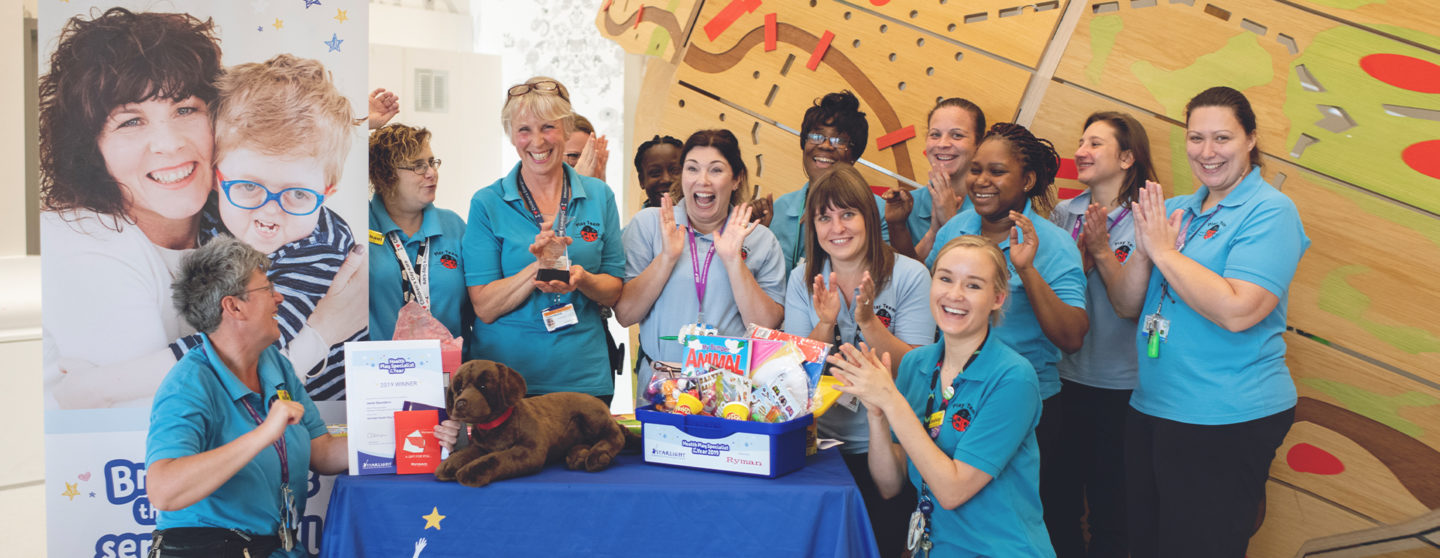
You’ll usually work in hospitals, hospices, and clinics, planning play activities to help children prepare for surgeries and other clinical procedures and calm their worries and concerns.
A combination of theoretical knowledge will back up your work and evidence-based practice, enabling you to design, implement, analyse, and evaluate therapeutic play programmes for children (from birth) and young people.
You’ll also help parents, carers, and the rest of the family, including siblings, by advising them on how to use play to help their children understand what’s happening.
Responsibilities
Throughout your apprenticeship, you may help:
- carry out therapeutic assessments
- design play activities to meet children’s individual needs
- plan and run play, art and craft activities at the bedside, on the ward or in a hospital play area
- create an environment that encourages play
- talk to parents or carers about the value of play and suggest suitable activities
- organise parties and other special events.
Salary
- Salaries for apprentice health play specialist’s working in the NHS range from £20,330 to £21,777 (band 3 of the NHS Agenda for Change (AfC) Pay Rates).
- Once qualified as a health play specialist, you can earn between £22,549 and £24,882 (band 4), rising to between £25,655 and £31,534 for more senior roles (band 5).
- Team leads and professional leads can earn between £32,306 and £39,027 (band 6). Salaries for play service managers and clinical specialists can be in excess of this.
Working hours
You’ll usually work a 37.5 hour week. Some posts include evening, weekend and bank holiday working.
Working environment
You could work in an NHS or private hospital.
You may need to wear a uniform.
Qualifications
Qualifications you can achieve as an apprentice health play specialist include:
Level 5 Health Play Specialist – Entry requirements for this level include 4 or 5 GCSEs at grades 9 to 4 (A* to C) and A levels, or equivalent, for a higher or degree apprenticeship. This qualification takes 24 months to complete.
Skills
On a health play specialist apprenticeship, you’ll learn:
- counselling skills including active listening and a non-judgemental approach
- knowledge of psychology
- customer service skills
- patience and the ability to remain calm in stressful situations
- sensitivity and understanding
- the ability to accept criticism and work well under pressure
- to be flexible and open to change
- the ability to understand people’s reactions
- to be able to carry out basic tasks on a computer or hand-held device.
Employers
The NHS employs the majority of health play specialists. You’ll most likely work at a hospital in any department that handles children. You may work in a large play area at a children’s hospital, such as Great Ormond Street or Alder Hey.
You might also work in a regular hospital ward or department that admits children. In these cases, you’ll most likely work in a smaller team in children’s, critical care, neonatal, or outpatient clinics.
Additional opportunities exist to work in private hospitals, hospices, community health and paediatric teams, and children’s homes.
Professional development
Although registration with HPSET is voluntary, it is highly encouraged since it proves that you adhere to a professional code of conduct and are committed to ongoing professional development (CPD).
Your registration must be renewed annually, and you must submit a professional growth profile every three years for audit.
NAHPS organises several conferences and events for its members, allowing you to broaden your knowledge and professional practice while networking with other professionals and locating area networking organisations.
Practice and collaboration in all areas of specialised health, such as cancer, will strengthen your skills and knowledge. Each part will address a variety of diseases and treatment approaches, and you will need to understand how they influence the child or young person’s life and how to meet their needs best. You will develop these skills and knowledge with various senior health professionals.
If you have at least two years of post-qualifying experience, you may train as an HPSET mentor for students.
Career prospects
Career growth is mainly based on gaining experience and engaging in CPD, while select health play professionals may pursue management or leadership training.
As you gain experience, you may be promoted to senior health play specialist and ultimately to more senior positions such as team leader and play service manager. To take advantage of opportunities for progress, you must be flexible about where you work and open to change employment.
As your career progresses, you will become more engaged in strategic planning for the whole department and will be responsible for managing personnel and finances.
With experience and further training, there are some opportunities to progress into lecturing or teaching. For example, you could pursue a career as a nurse, occupational therapist, or speech and language therapist.
